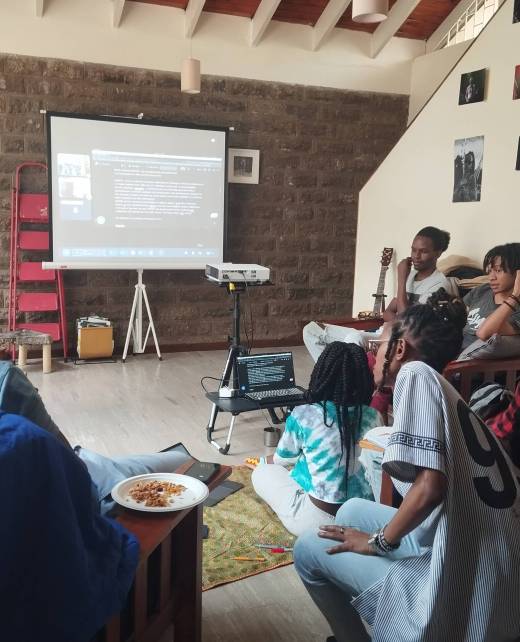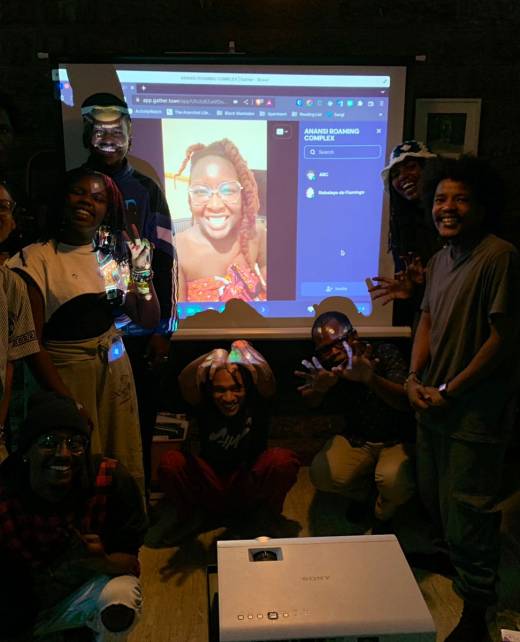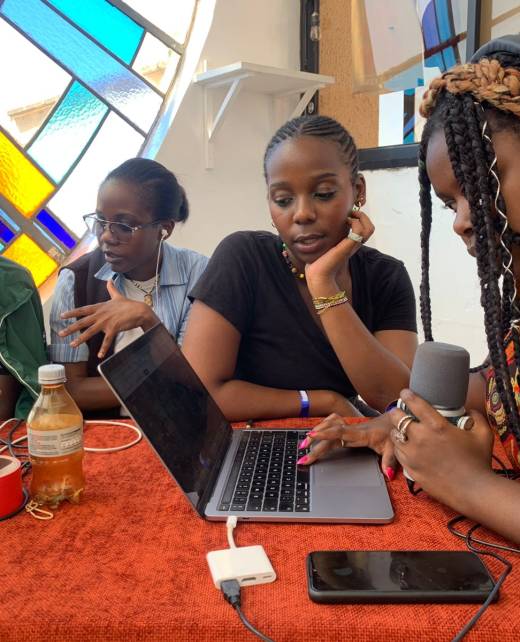How do we operate as a collective?
As a collective, we have split up our mode of operations into three key categories that define our process on a holistic level, namely; Process, Praxis and Protocol.
By separating our process into inter-linked modes of operation, we’re able to analyze any action within the collective to the standards of these three pillars, and determine the best way forward in each of them.
What are the three pillars of our process?
Process:
This refers to the methods and techniques we use to actualize our projects and ambitions. From how we utilize online workflows [with Notion, Jitsi, Gather Town etc.] to the establishment on internal Councils that operate on specific areas [llke Technology, Governance & Social Care], to how we publish internal documentation on our projects and timelines.
The process is how we do what we do, and the systems we use that enable this.
Praxis:
This is a set of philosophical touchstones that form the foundational basis of al the processes in the Collective, and that we continually engage in throughout our practice. This includes principles like prioritizing open-source software, skill and knowledge sharing, democratic governance, social & personal responsibiitiy, among others.
The praxis is the collective body of philosophical principles that inform all areas of our practice.
Protocol:
This refers to the principles of administration and operation within the Collective. Whether it’s on the economics with accounting & E-Commerce, or the administrative side with membership and voting guidelines, or the operations side in how we conduct online meetings and time-keeping.
We are in the process of developing Membership and Voting Guidelines, as a touchstone to fully registering as an operating company and solidifying our protocol into a firm operations process that still prioritizes our praxis in terms of collective responsibility and governance.
The protocol is the collective administrative and operational methods we use to actualize our work.
What is the Council approach?
As a part of our holistic process, we have recently established a set of semi-autonomous groups that focus on specific areas within the Collective.
This ties into our Praxis well by dividing key areas into small groups of collective responsibility, which allow independent work on multiple projects as opposed to a singular approach to accomplishing things.
There are currently four coucils in operation: Governance, Economics, Social Care & Technology.
What do the Councils do?
Governance:
This council is primarily concerned with the administration and operations of the Collective on a macro level. From the process of establishing clear protocols and procedures, managing conflict resolution, to determining responsibilities, and many more.
Economics:
The Economics council exists to evaluate and broaden the economic responsibilites of the Collective. From financial distribution protocls to account management, and from integrating economic policies with our projects and spearheading new revenue streams, among many others.
Technology:
The Tech Council is responsible for managing and engaging with the various technologies we use, and those we would like to experiment with. From testing out new technologies like AI Note-Taking and new meeting platforms, to onboarding others with technological concepts and software.
Social:
The Social Council keeps track and maintains the social and personal health of the Collective and its’ members. From organising in-person meetings to weekly checkups and social projects, this Council makes sure that we keep in touch with and prioritize the human side of our work.

Praxis
As a collective, we continually develop and follow praxis that aligns with our overall philosophies of democracy, distribution and decentralization. We’re praxis-first, working to test, develop, and prove out our techniques before sharing.
Consensus Decision Making
This principle emphasizes input, participation and responsibility in the decision-making process, with members having equal votes in the process.
Rather than relying on majority rule, consensus decision making aims to reach an agreement that reflects the collective desires and needs of all members, while maintaining an open dialogue.
Collective Budgeting
Unlike traditional top-down approaches, collective budgeting involves the active participation of all members in determining how financial resources are allocated and utilized within the collective.
This process aims to promote transparency, equity, and accountability, ensuring that the budgets and financial processing reflects the democratic principles of the collective.
Governance Protocol
Our Governance Protocol is a set of directives, principles and laws that will define our mode of operations across all parts of the collective. It is currently under development.
Rather than operating with a central authority, a governance protocol fosters a decentralized and participatory approach to decision making, where all members have a meaningful voice in shaping the collective’s policies, structure, and operations.
Conflux
This is a method of live artistic collaboration working across multiple mediums and locations in real-time. Visual artists, live musicians, DJ’s, spoken word (and many more) are all simultaneously incorporated through a co-ordination of live performance and interlocking software.
It is one of the main artistic outlets for the Collective, showcasing our creative, technical, teaching and experimental drives in a unique and collaborative way.
Conflict Resolution
We developed a Conflict Resolution protocol, a process which ensures that any issues and/or concerns within the Collective are addressed directly and treated with great care.
We are committed to providing a safe and open space for the entire community, and having a clear mode of conflict resolution also ensures a level of safety and responsibility to speak in situations that many not be otherwise possible.
Praxis Templates
We have several internal documents and practical tools regarding the various processes we use, not only for documentation purposes but to also keep us efficient given how many processes we engage with.
For example, meeting and project templates with extensive guidelines are present on our Notion page for all members to make use of. This allows anyone within the Collective to work fast and with familiar tools.

Philosophy
We continually develop and follow our philosophy that aligns with our overall principles of distribution and decentralization.
Distribution
We have several internal documents and practical tools regarding the various processes we use, not only for documentation purposes but to also keep us efficient given how many processes we engage with.
For example, meeting and project templates with extensive guidelines are present on our Notion page for all members to make use of. This allows anyone within the Collective to work fast and with familiar tools.
Decentralization
Decentralization promotes the redistribution of political, economic, and social authority away from a single centralized authority to more localized groups, enabling greater autonomy and self-determination.
This approach allows for the recognition and preservation of diverse cultural identities and traditional knowledge, while fostering grassroots participation in decision-making. By embracing decentralization, we work towards a more equitable distribution of resources and the development of sustainable, community-led solutions to the challenges faced.
Communalism
Communalism, or open resource sharing, involves the transparent and equitable distribution of knowledge, technology, and external resources, providing all members with the opportunity to benefit from collective resources.
By dismantling the barriers to access and promoting the sharing of information and resources, we can work towards narrowing the economic and technological gaps that have historically marginalized African nations.
Collectivism
Collectivism emphasizes the communal responsibility and shared ownership of resources and production, placing the wellness and progress of the community above individual interests.
Through collectivism, we can actively work towards dismantling systemic inequalities, and building a more just and inclusive society for all Africans. Given the fact that power distribution has been a historically significant issue in the progress of pan-Africanism, we hold this as one of our most important principles.
Humanism
Humanism promotes the value and dignity of every individual, irrespective of race, gender, religion, or socioeconomic status. It calls for the recognition of universal human rights, the eradication of discrimination and oppression, and the pursuit of social and economic justice for all.
Embracing humanism in the African context involves addressing historical injustices, empowering marginalized communities, and fostering a society based on compassion, equality, and the fulfillment of human potential. By placing humanism at the forefront of our collective vision, we work towards creating a pan-African society where the well-being and rights of every individual are upheld and celebrated.
Democracy
We believe that democracy and democratic principles are crucial for the liberation and empowerment of the people.
It provides a system of accountability for those in positions of power, and promotes the representation of diverse perspectives and interests. In the context of a Pan-African collective, the complex history of colonialism, authoritarianism, and inequality drives us to embrace democratic principles is essential for achieving social justice, equality, and the realization of the collective will of the people.

Protocol
As a collective, we continually develop and follow protocol that align with our overall philosophies of democracy, distribution and decentralization.
Membership
We are currently developing our Membership structure as part of our Governance Protocol. Membership is more than just a declaration of support; it signifies a dedication to driving impactful progress on a personal and collective level.
By joining forces with a diverse community of activists, you can play a pivotal role in amplifying marginalized voices and fostering solidarity.
Voting
We operate on a democratic voting structure where each Member has the same level of responsibility and weight in the decision-making process, as we keep a priority on open dialogue. This structure is consistent across all our various projects and processes.
Participating in the equal voting structure is crucial to shaping a fair and inclusive decision-making process within the Collective.
Meetings
As a principle, we maintain weekly online meetings and regurlarly schedle physical meetings between Collective members. Keeping a strong and consistent meeting structure allows us to anticipate and prepare for future endeavours.
By keeping clear templates and systems to enable our meetings (with tools like Notion, Jitsi and GatherTown), it’s simple for anyone within the Collective to set up and co-ordinate meetings in the same ecosystem.
Responsibilities
This is a method of live artistic collaboration working across multiple mediums and locations in real-time. Visual artists, live musicians, DJ’s, spoken word (and many more) are all simultaneously incorporated through a co-ordination of live performance and interlocking software.
It is one of the main artistic outlets for the Collective, showcasing our creative, technical, teaching and experimental drives in a unique and collaborative way.
Registration
We developed a Conflict Resolution protocol, a process which ensures that any issues and/or concerns within the Collective are addressed directly and treated with great care.
We are committed to providing a safe and open space for the entire community, and having a clear mode of conflict resolution also ensures a level of safety and responsibility to speak in situations that many not be otherwise possible.

